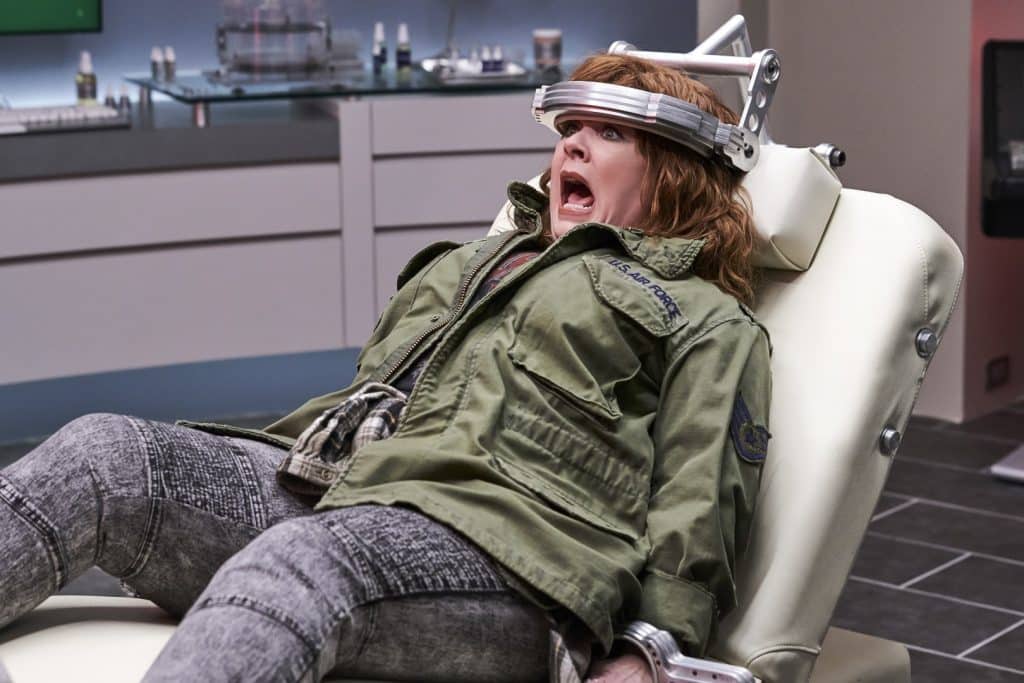Read also:
How to Watch FX Live Without CableHow To Watch AMC Without CableHow to Watch ABC Without CableHow to Watch Paramount Network Without CableThe newest Falcone/McCarthy collaboration feels just like the others: disappointing.
Mere moments before the whole world shut down last year, I reviewed the Vin Diesel vehicle/comic adaptation Bloodshot. In that review, I talked about how the film often felt like a refuge from another time, an earlier era of superhero movies, and that there was a certain charm in that. Thunder Force similarly feels like a holdover from a different time, but as an anachronism, it offers far less charm. If Bloodshot felt like a pale but pleasant copy of films from the Raimi Spider–Man portion of the era, Thunder Force feels a bit more like Sky High’s cousin, obsessed with seeming more mature.
In a world where a cosmic accident seemingly only awarded superpowers to sociopaths—or the powers caused sociopathy, it’s unclear—Emily Stanton (Octavia Spencer as an adult) is orphaned by the actions of those evil super-beings, nicknamed Miscreants. An intelligent girl, she’s endlessly bullied at her new school until classmate Lydia Berman (Melissa McCarthy as an adult) nominates herself to the role of best friend and protector.
It all works great for a time, but eventually, the two have a falling out. Some 20 years later, they reunite. Emily is now a single mom tech genius mogul and Lydia is a neighborhood fixture who works at a local warehouse. An accident, however, forces them together as Chicago—and maybe the world’s?—only good super-powered people, Thunder Force.
It’s a smart enough starting point, but the reality of the film’s world remains underdeveloped. Thunder Force centers on Chicago, but it also seems like Chicago is the only place where Miscreants exist. True or not, the movie gives us no sense of a world beyond the city limits. Moreover, even if Chicago is the only place on Earth with super-powered baddies, it seems remarkably unchanged for living under the thumb of supervillains for almost four decades. In a reality where one of the first things Miscreants did was blow up an elevated train, would they only be knocking over liquor stores today?

Some of this is nitpicking, I’ll allow. After all, if the movie doesn’t want to think about the larger worldwide sociopolitical implications of random individuals with Antisocial Personality Disorder being given the ability to shoot lasers out of their eyes or fly, we should meet them at the story they want to tell. However, the lack of detail, the seeming absence of creativity is something present throughout Thunder Force. By not engaging with how much living every day with the chance of a Miscreant attack might make life as a Chicagoan scary or miserable, the script robs the movie of any sense of stakes or excitement.
There is some sense of how random Miscreant activity can be, but the only consequences seem to be a broken window, a chipped statue, yet another night ending in a stick-up. It all feels so bland. If Thunder Force meant that as some sort of commentary — about how anything can become mundane — that might be interesting. However, it doesn’t seem to care one bit about that idea.
This narrative sloppiness feeds into the sense that Thunder Force is only half a thing. Partially conceived, partially delivered. The vibe and look often call to mind a family superhero film as does the predicament of Emily’s daughter Tracy (Taylor Mosby)—the classic dilemma of wanting to be special and make mom happy, but also wanting to feel like a kid. On the other hand, the movie is decidedly horny in a way that feels way out of step with the Disney crowd. I’m not saying that a scene depicting Lydia smearing butter on The Crab’s (a very good Jason Bateman) appendage is pornographic, per se, but it isn’t not, you know what I mean?
What works comes from the interpersonal dynamics. McCarthy is especially good in this arena, putting in so much more effort than the movie deserves. The way she depicts her sadness about losing Emily’s friendship, especially early on, is never over the top — you can feel that ache. McCarthy also does her best work alongside Mosby, the only scenes that get at her character’s central struggle.
Thunder Force just doesn’t give you enough of anything to be worth your time.
Some of the comedy works too, but far less reliably. Bateman does this thing where he scuttles from trouble (like a crab, you see), and it’s perfectly silly. Bobby Cannavale is so charismatic that he makes nearly all his gags as politician William “The King” Stevens work, despite being pretty underwritten. Similarly, Pom Klementieff as the Miscreant “Laser” doesn’t have the most developed character, but she finds just enough strangeness in her performance to earn a giggle here and there.
Still, Thunder Force feels like almost every other Ben Falcone directed, Melissa McCarthy-starring vehicle. They are two undeniably funny people, and yet their movies are marked by a flagging joke density and few moments that break the chuckle barrier. They seem built around a premise and McCarthy’s talents with nothing else inside them. Falcone’s flat visuals do Force no favors either.
As superhero parody, it barely registers. As a story of old friends reconnecting, it feels under-committed. As a joke delivery vehicle, it seems slack. Too inappropriate to be a kids’ movie, too mild and childish to be a bawdy adult comedy. Ultimately, Thunder Force just doesn’t give you enough of anything to be worth your time.
Thunder Force power leaps onto Netflix on April 9th.